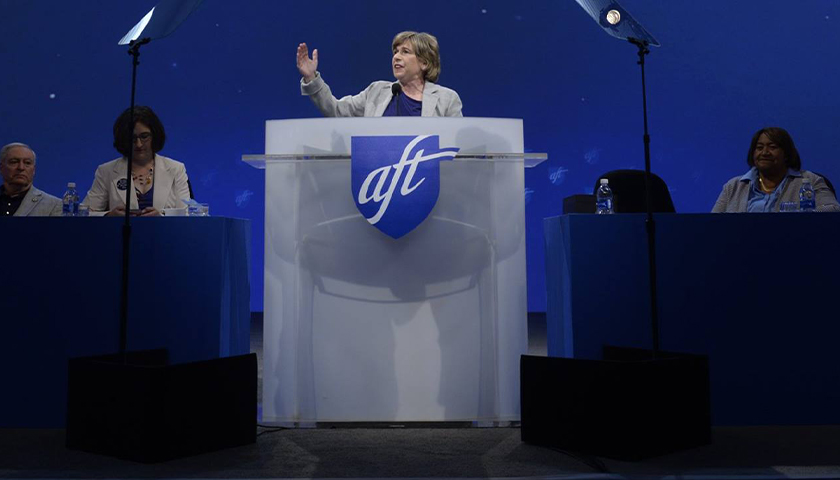A Tennessee law that prohibits teacher association dues from being automatically deducted from paychecks may go into effect after a three-judge panel declined to issue a temporary halt to it as requested by the Tennessee Education Association (TEA).
The Chancery Court for the State of Tennessee Twentieth Judicial District, Davidson County, denied last week the teachers’ union’s motion, ending a previous temporary halt to the practice of payroll deduction for dues for professional employee organizations.
The court ruled:
We hold that the Plaintiffs are unlikely to succeed on the merits of either claim. The Act does not impermissibly embrace more than one subject, and its caption fairly describes its contents. The Act also does not repeal PECCA’s [Professional Educators Collaborative Conferencing Act] requirement that payroll deductions be discussed as part of the collaborative conferencing process. Finally, Plaintiffs have failed to show that the Act substantially impairs either set of contracts implicated by the change in the payroll deduction process.
In May, Governor Bill Lee (R-TN) signed the Teacher Paycheck Protection Act, a bill that sought to increase the teacher pay rate in the state to a minimum of $50,000 annually by the year 2027. The ban on the collection of association dues via deduction from paychecks was included in the budget bill.
The governor’s office noted the Teacher Paycheck Protection Act continues Lee’s commitment to increase teacher pay each year since taking office and will support students and teachers by:
- Making Tennessee a top-10 state for teacher pay to recruit and retain highly qualified teachers
- Raising the minimum teacher salary to $50,000 by 2026, a significant increase from $35,000 in 2019
- Protecting teachers and taxpayers by ensuring that union membership dues are never automatically deducted from teacher paychecks
In Tennessee Education Association v. Bill Lee, TEA claimed the new law would injure contracts already in existence between associations and local school boards. The union argued the law was unconstitutional in that the state Constitution prohibits a bill that “embraces more than one subject” from becoming law.
Though the full lawsuit continues, Chief Judge Chancellor Anne C. Martin, Judge A. Blake Neill, and Chancellor Pamela A. Fleenor denied the plaintiffs’ motion, stating the union was not likely to succeed since their current arguments were lacking.
“The results were predictable,” JC Bowman, executive director of Professional Educators of Tennessee, a non-partisan teacher association based in Nashville, told The Tennessee Star. “The court was quick to point out some of the fallacies of their arguments.”
Bowman said the salary raise his organization had “long advocated” also included a prohibition on dues collection by local school boards in the legislation.
“Like the union, we would have preferred both issues be addressed separately. However, the legislation did not contain a severability clause that would allow the remainder of the legislation’s terms to remain effective, even if one or more of its other terms or provisions are unenforceable or illegal,” he said. “The union argument is that the Act combines two subjects, but only one portion of the Act is related to wages.”
“Without wages, there is no payroll, and without payroll, there can be no payroll deductions,” the court ruled.
Bowman said his association was “unwilling to risk the salary increases for all educators that we had long advocated because of the lack of a severability clause.”
“In addition, we have long been denied equal access to payroll deductions,” he noted. “The union was often an obstacle to that equal access. Therefore, we created our own online system where members could pay their dues conveniently and securely.”
Bowman said that despite the increased costs of credit card and bank processing fees, Professional Educators of Tennessee has kept its annual dues under $200 per year.
“In this case, each Local Education Association Plaintiff operates under a ‘unified membership structure’ with the Tennessee Education Association and the National Education Association,” he observed. “Therefore, any educator who joins a local affiliate ‘also agrees to join the TEA and NEA and to pay the dues required for membership in each of the associations.’”
Bowman cited the Education Intelligence Agency, which reported in a post titled “Dues Level for Every NEA State Affiliate 2020-21” that, nationally, the “average union teacher paid $650.64 plus local dues.”
The association executive director also commented that “Boards of Education have the right to change their payroll practices. Payroll deductions for political activities are specifically excluded from the collaborative conferencing process under Professional Educators Collaborative Conferencing Act (PECCA).”
Bowman also observed the current order cited TEA President Tanya Coates’ testimony, in which she said, “Members may opt out of automatic deduction payments between August 1 and August 31 of each year; otherwise, the deductions take place on a continuing basis.”
The Tennessee Star contacted TEA for comment but did not hear back before press time.
– – –
Susan Berry, PhD is national education editor at The Star News Network. Email tips to [email protected]






It has been long overdue to reign in the teachers union. They are employees employed by the tax payer and are contracted to effectively teach the curriculum articulate by the school board and the school administration. They do not have the authority to teach unapproved courses such as CRT and may not introduce their personal ideology. Teachers who waiver from that contract should be dismissed with cause immediately. They are breaching the contract they signed. Salary negotiations need to be removed from the bargaining process legislatively with increases tied to the cost of living. Take the salary component out of the discussion and union membership will drop significantly as it had in Wisconsin.